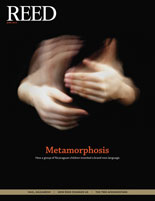
IRIS login | Reed College home Volume 92, No. 2: June 2013
Reediana
Watching War (Stanford University Press, 2012)
Jan Mieszkowski [German 1997–]
By Rebecca Perry

Watching War presents the intriguing idea that 200 years after Waterloo, “the experience of the battlefield audience is still largely defined by what it does not or cannot see.”
Mieszkowski argues that war first emerged as a true mass spectacle on the vast battlefields of the Napoleonic era, in conflicts too large to be observed and too complex to be understood except through the imagination.
Drawing on works of literature, philosophy, military theory, and war photography, Watching War examines representational dynamics at work on battlefields from Waterloo to Afghanistan, and asks how war’s imagery is created. In iconic battle images from the Civil War to Vietnam, significance—even of the frozen instant of death—is obscure, and the photographic gaze fails to adequately narrate war.
For Mieszkowski, war becomes total when it is too large to be viewed and must be imagined. Modern imaginaries reflect the representational authenticity of observations increasingly framed, he argues, by the modern viewer’s frame of reference—“. . . the perspectival logic and graphic design of video games, the very games now used by the military to train army recruits.” One might also ask what process is at work as war is increasingly apprehended through sensors, images, and data harvested by remote human and machinic viewers.
What replaces the vanishing spectacle of war, as large, clearly defined battlefields give way to pockets of “irregular warfare” indistinguishable from criminal acts? Are audiences, conditioned by Hollywood spectacles, inured to “the powers of simulation and irony that now shape the battlefield”? These are difficult and important questions, and Mieszkowski mines cultural and media accounts for clues. Watching War is a thoughtful and valuable contribution to the conversation on observing, representing, and imagining war.

LATEST COMMENTS
steve-jobs-1976 I knew Steve Jobs when he was on the second floor of Quincy. (Fall...
Utnapishtim - 2 weeks ago
Prof. Mason Drukman [political science 1964–70] This is gold, pure gold. God bless, Prof. Drukman.
puredog - 1 month ago
virginia-davis-1965 Such a good friend & compatriot in the day of Satyricon...
czarchasm - 4 months ago
John Peara Baba 1990 John died of a broken heart from losing his mom and then his...
kodachrome - 7 months ago
Carol Sawyer 1962 Who wrote this obit? I'm writing something about Carol Sawyer...
MsLaurie Pepper - 8 months ago
William W. Wissman MAT 1969 ...and THREE sisters. Sabra, the oldest, Mary, the middle, and...
riclf - 10 months ago